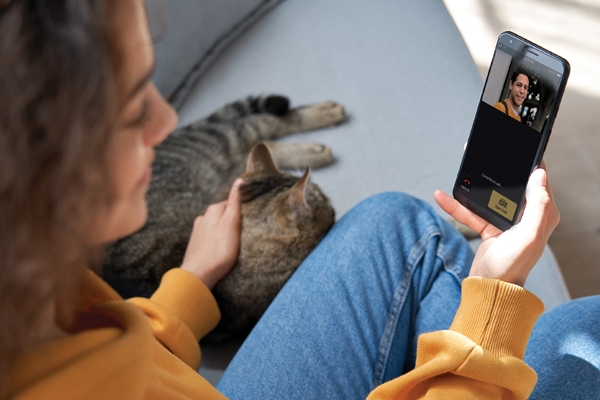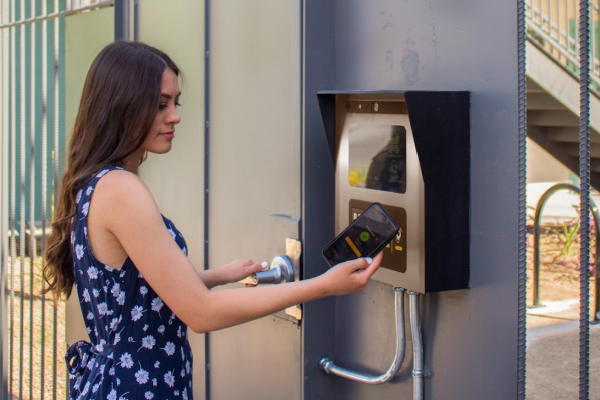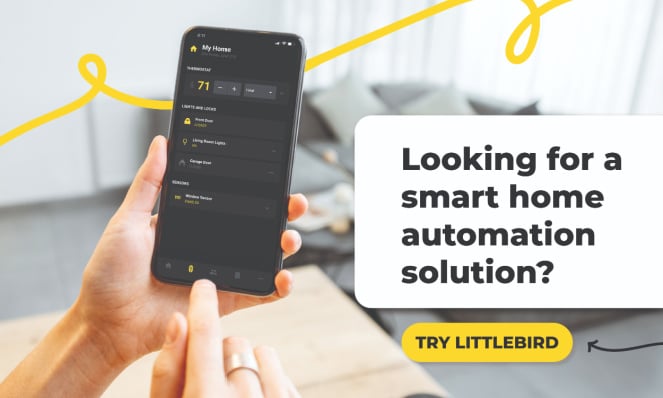Guest Management Proptech for Multifamily Buildings
As a multifamily property manager, you know that managing guests can be a challenging task.
You want to ensure that residents and their guests feel safe and secure, but you also want to make the access control process as convenient as possible.
In this article, we'll discuss the benefits of technology for guest management in multifamily buildings and explore some of the best solutions available.
This blog post covers…
- What is Guest Management?
- The Challenges of Traditional Guest Management Systems
- Benefits of Using Proptech for Guest Management
- Choosing the Best Guest Management System
What is Guest Management?
Guest management in multifamily communities refers to the process of managing and regulating access to a community and/or unit for residents and their guests.

The best guest management systems feature seamless integration with your property’s access control system to ensure that only authorized guests enter the community or building. This helps reduce the risk of any disturbances or potential security issues.
The Challenges of Traditional Guest Management Systems
Managing guest access in a multifamily building can be difficult for several reasons.
Traditional methods of guest management, such as key systems and logbooks, can be time-consuming, inefficient, and prone to errors.
Inefficient Tracking & Reporting
Traditional key systems and paper logbooks present several drawbacks.
- Traditional keys can be cumbersome, easily lost or duplicated, and may pose security risks if not managed properly.
- Paper log books can be difficult to track and may not provide accurate information about who is entering the building, as entries can be illegible, incomplete, or even fraudulent.
As a result, these outdated methods can make it challenging for property managers and residents to identify potential security threats or track down guests who may have caused damage or other disturbances.
For example…
- If a key is lost or stolen, it may be difficult to determine who was responsible for the breach.
- If a guest causes damage or violated community policies, it may be challenging to hold them accountable without clear records of their entry and exit times.
Time-Consuming Processes
Guest management can be tedious work, taking up valuable staff time and resources. This is because traditional guest management processes often involve manual tasks like…
- Checking IDs
- Issuing keys or fobs
- Logging guest information
These tasks can result in long wait times for both residents and their guests.
Furthermore, these manual processes can be error-prone and may lead to inaccuracies in guest information. If a guest's information is not correctly recorded or their access key is not properly assigned, it may cause confusion and delays for both the guest and the property manager.
The Benefits of Using Proptech for Guest Management
Fortunately, technology has made it possible to streamline guest management, making it easier for property managers and residents alike.
Enhanced Security
Mobile-based access control allows guests to present a unique QR code using their smartphone with compatible video intercoms and seamlessly enter a community.

This eliminates potential long waits at the front gate as well as certain security risks including…
- Unauthorized key copying
- Residents sharing their personal access codes
- Handing off physical fobs that can get lost or stolen
Resident Convenience
With mobile-based access control, guests can present their unique credentials, such as a digital access code or QR code, to gain entry to the community or apartment building without the need for the resident to physically escort them.
This convenience is particularly valuable for busy residents who may not have the time to personally greet and escort each guest. With mobile-based access control, residents can easily grant access to their guests remotely, regardless of their location.
Remotely Monitoring & Tracking
With cloud-based guest management, a log of guest access is automatically recorded and stored in the cloud.
Property managers can view this log remotely from any device with an internet connection, providing them with up-to-date information on who is entering and leaving the community or apartment building.
.jpg?width=600&height=400&name=Manager%20portal%20and%20littlebird%20app%20mockup%20%20(1).jpg)
This can be especially valuable in situations where there may be concerns about security or suspicious activity.
Cloud-based guest management systems also provide property managers with valuable insights into guest traffic patterns and peak hours. This data can help property managers to optimize staffing levels and amenities to better serve residents and their guests.
It can also aid in identifying any bottlenecks or issues with the guest management process, allowing property managers to make improvements and enhance the overall guest experience.
Choosing the Right Guest Management Solution for Your Building
Since multifamily and commercial buildings often have differing needs, there isn’t just one guest management system out there. When selecting a guest management solution for a multifamily community, it’s important to look for the following key features:
- Resident Mobile App
- Guest Access Code & Schedules
- Cloud-based Software
- Smart Home Automation
1. Resident Mobile App
A resident app is a must-have for the benefit of both property staff and residents. All within one app LittleBird residents can send each guest a unique access code and QR code from anywhere in the world, at any time.
2. Guess Access Codes & Schedules
Access Codes
Access codes make it so residents don’t have to be home to let their guests in.
Instead, they can send their guest an access code & QR code to their smartphone, allowing the guest to let themselves in.
Let’s also not forget that one friend we all have – the friend that no matter how many times we send instructions on how to get into your home, they end up confused and calling you for help.
LittleBird’s Video Intercom has them in mind with its three guest access options:
- Present a guest QR code to the video intercom.
- Enter a unique guest access code on the video intercom keypad.
- And if all else fails, guests can look up the resident's name in the video intercom directory to start a one-way video call.
Guest Schedules
LittleBird scheduled guest access adds even more convenience to both property staff and residents’ busy schedules by granting access to guests in advance.
Using the resident app, residents and property staff can set restricted access to their guests for defined days of the week and times. They can also immediately revoke access when needed.
Here’s an example:
- Sam is a resident at ABC Living.
- Sam has a dog walker named Gio.
- Gio walks Sam’s dog Monday mornings from 9-10 AM.
- Instead of hiding a key that could get stolen, Sam adds Gio as a scheduled guest in his LittleBird Living resident app.
- Gio receives a unique access code that grants him access to Sam’s community and unit during the timeframe of 9 AM to 10 AM only on Monday mornings.
- If Sam ever decides to switch dog walkers, he can immediately revoke Gio’s access at a tap of a button.
🐥Tip: Property staff can also assign regular vendors the role of “property guest” in the management portal.
How to Grant or Revoke Guest Access with LittleBird
3. Cloud-based Software
Cloud-based guest management systems offer several benefits over traditional, server-based systems, particularly when it comes to data storage and remote access.
Data Storage
One of the key advantages of cloud-based software is that it allows property managers to securely store all guest management data off-site, eliminating the need for clunky servers that can take up valuable space in a closet or storage room.
With cloud-based storage, all guest management data is securely stored in the cloud, accessible only to authorized users with the proper credentials. This provides property managers with peace of mind, knowing that their data is being stored securely and is protected from physical damage, theft, or other risks that may be associated with on-site data storage.
Remote Access
Cloud-based guest management software also enables property staff to edit guest permissions remotely through a mobile device, providing greater flexibility and convenience. This means that property managers can easily grant or revoke access to guests from any location, without having to physically be on-site.
4. Smart Home Automation
With smart home devices like locks, lights, and thermostats, residents can make their guests comfortable and welcome without having to physically be there.
Smart Locks
With smart locks, residents can grant access to guests remotely, using their smartphones or other mobile devices. This eliminates the need for physical keys or the hassle of coordinating in-person handoffs.
Smart Lights
Are the lights off at home? Residents can flick on the lights in their homes before guests arrive with a tap of a button in the LittleBird Living resident app.
Smart Thermostat
Residents can take prepping their apartment for guests one step further by setting the thermostat to the optimal temperature before their guests come over.
Smart Sensors
Smart home motion sensors provide real-time monitoring of guest access, allowing residents to receive notifications and alerts when guests arrive or leave.

In Summary…
- Guest management is a critical component of multifamily property management, and choosing the right guest management solution can help to streamline operations and improve security.
- A robust guest management system can help property managers to monitor and control guest access, identify potential security threats, and address any issues that arise with guests.
- Guest management systems can help to improve the overall resident experience by reducing wait times and providing convenient access options.
-1.png?width=5935&height=1114&name=NEW%20LU%20%E2%80%93%20Long%20Logo%20%E2%80%93%20Dark%20(1)-1.png)
Comments